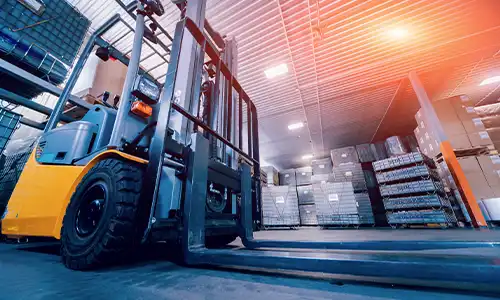Freight Forwarding – What It Is & How It Works

Published: September 12, 2024 | Last Updated: September 12, 2024
Ever wondered how products from across the globe end up in your local stores or at your doorstep? The answer lies in freight forwarding. This critical component of international trade keeps goods flowing smoothly across borders and oceans. Let’s dive into what freight forwarding is, how it works, and why it matters for Australian businesses.
Demystifying Freight Forwarding
At its core, freight forwarding is the orchestration of shipping goods from one international destination to another. Think of freight forwarders as the conductors of a complex logistical symphony, ensuring every instrument plays its part at the right time. These logistics experts manage the intricate process of moving cargo across international borders, handling everything from documentation and customs clearance to negotiating freight charges and tracking shipments.
Freight Forwarding in the Bigger Picture
To truly understand freight forwarding, we need to see how it fits into the larger logistics and supply chain landscape:
Freight: This is the actual cargo being transported. It’s the physical goods moving from point A to point B.
Logistics: The broader process of managing how resources are acquired, stored, and transported to their final destination. It’s the overarching strategy of getting things where they need to go.
Supply Chain: This encompasses the entire network involved in producing and delivering a product, from raw materials to the end consumer. It’s the full journey of a product from creation to consumption.
Freight Forwarding: This is the specialized service within logistics that focuses on the efficient movement of goods across international borders. It’s the expert touch that smooths out the complexities of global shipping.
While freight is what’s being moved and logistics is how it’s being moved, freight forwarding is the specialized service that navigates the intricacies of international transportation.
The Freight Forwarding Process
So, how does freight forwarding work in practice? Let’s break it down:
Export Haulage: Transporting goods from the seller to the freight forwarder’s warehouse.
Export Customs Clearance: Ensuring all necessary documentation is in order for the goods to leave the country of origin.
Origin Handling: Inspecting and validating the cargo against booking documents.
Import Customs Clearance: Preparing and submitting documents required to facilitate import clearance.
Destination Handling: Collecting the cargo from the port of arrival.
Import Haulage: Delivering the goods to the final destination.
Throughout this process, freight forwarders leverage their expertise and global networks to ensure smooth, efficient transport.
The Value of Freight Forwarding
You might wonder, “Why not handle shipping myself?” Unless you’re prepared to become an expert in international shipping regulations, customs documentation, and global transport networks, freight forwarding offers significant advantages:
Expertise: Freight forwarders navigate the maze of international shipping regulations with ease.
Time Efficiency: They handle time-consuming logistics tasks, allowing you to focus on your core business.
Cost-Effectiveness: Through established relationships with carriers, forwarders often secure better rates.
Flexibility: They can adapt quickly to changing circumstances or requirements.
Comprehensive Documentation Management: Reducing the risk of delays or penalties due to paperwork errors.
International Freight Forwarding
While we’ve discussed freight forwarding in general, it’s worth emphasizing that much of this industry operates on a global scale. International freight forwarding involves moving goods across national borders, dealing with various customs regulations, international trade laws, and managing multiple modes of transportation.
Australian businesses engaging in import or export activities often rely on international freight forwarders to navigate the complexities of global trade. These specialists have in-depth knowledge of international shipping routes, customs procedures in different countries, and the documentation required for smooth cross-border transactions.
Freight Forwarders vs. Shipping Forwarders
You might come across the terms “freight forwarder” and “shipping forwarder” and wonder if there’s a difference. In practice, these terms are often used interchangeably. Both refer to companies that organize shipments for individuals or corporations to get goods from the manufacturer or producer to a market, customer, or final point of distribution.
However, some might use “shipping forwarder” specifically for sea freight, while “freight forwarder” could encompass all modes of transport. In the Australian context, “freight forwarder” is the more commonly used and comprehensive term.
Container Forwarding Services
A significant portion of international freight moves in containers, and many freight forwarders specialize in container forwarding services. This involves:
FCL (Full Container Load): Managing shipments that fill an entire container.
LCL (Less than Container Load): Consolidating multiple shipments from different customers into a single container.
Container tracking: Providing real-time updates on the location and status of containers.
Container insurance: Offering protection against loss or damage during transit.
Freight forwarders help businesses choose between FCL and LCL based on their shipment size, budget, and time constraints, ensuring the most cost-effective and efficient container utilization.
The Crucial Role of Customs Clearance
While we touched on customs clearance earlier, it’s worth emphasizing its critical role in the freight forwarding process. Customs clearance ensures that all imported and exported goods comply with the regulations of the countries involved in the shipment.
Freight forwarders play a vital role in this process by preparing and submitting necessary customs documentation, calculating and facilitating payment of duties and taxes, communicating with customs officials to resolve any issues, ensuring compliance with import/export regulations, and advising clients on customs requirements and potential restrictions.
Their expertise in this area can prevent costly delays and penalties, making the customs clearance process as smooth as possible for their clients.
Understanding Freight Handling
Freight handling is a crucial component of the freight forwarding process. It refers to the physical movement, loading, unloading, and storage of freight at various points along its journey. This includes:
Warehousing: Storing goods before or after shipment.
Consolidation: Combining smaller shipments into larger ones for more efficient transport.
Break Bulk: Separating large shipments into smaller ones for final delivery.
Packaging and Labeling: Ensuring goods are properly packaged and labeled for transport.
Loading and Unloading: Safely transferring goods to and from various modes of transport.
Efficient freight handling is essential for preventing damage, reducing costs, and ensuring timely delivery. Freight forwarders coordinate these activities, often working with specialized handling agents at ports, airports, and warehouses.
Choosing a Freight Forwarder in Australia
When selecting a freight forwarder in Australia, consider these factors: Industry Experience and Reputation, Range of Services Offered, Global Network and Partnerships, Technology and Tracking Capabilities, Customer Service Quality, and Relevant Accreditations (e.g., Australian Trusted Trader status).
It’s worth getting quotes from multiple forwarders and comparing their services, pricing, and terms to find the best fit for your business.
The Future of Freight Forwarding
The freight forwarding industry is evolving with technological advancements. Digital platforms, blockchain, and AI are streamlining processes, improving transparency, and enhancing efficiency. Australian businesses can look forward to more integrated, data-driven freight forwarding services in the coming years.
The Bottom Line
Freight forwarding plays a crucial role in global trade, simplifying the complex process of international shipping for businesses. By understanding freight forwarding and its benefits, Australian companies can make informed decisions about their logistics needs and improve their supply chain efficiency.
For businesses looking to optimize their international shipping processes, consider reaching out to experienced professionals. At Freight Assist Australia, we’ve been helping businesses navigate the complexities of international logistics since 2012. Get in touch to explore how we can support your business’s global shipping needs and keep your supply chain running smoothly.
Dangerous & Hazardous Goods
Metro Distribution
3PL Warehousing & Distribution
Interstate Freight

Compliant, safe and secure transportation of dangerous & hazardous freight.

Door-to-door, store-to-door metro taxi truck services – no job too small.

Efficient, streamlined 3PL solutions for storing and distributing your freight.

Safe, reliable state-to-state transport for shipments ranging from a single pallet to a full truckload.



